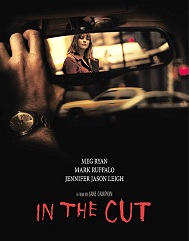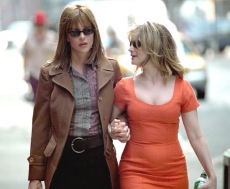|
In the Cut
|
| |
 |
USA, 2003. Rated R. 119 minutes.
Cast:
Meg Ryan, Mark Ruffalo, Jennifer Jason Leigh, Kevin Bacon, Nick Damici,
Sharrieff Pugh, Sunrise Coigney, Susan Gardner, Heather Litteer
Writers: Susanna Moore and Jane Campion, based on Moore's novel
Original Music: Hilmar Örn Hilmarsson
Cinematography: Dion Beebe
Producers: Laurie Parker, Nicole Kidman
Director: Jane Campion
LINKS
|
"[I]t was not knowledge but unity that she desired, not inscriptions on tablets,
nothing that could be written in any language known to men, but intimacy itself,
which is knowledge, she had thought..."
—Lily Briscoe in To The Lighthouse, by Virginia Woolf
"The man who sets his expectations low will seldom be disappointed"
—18th Century proverb
 s
there another director who disappoints as much as Jane Campion? It's been ten
years since The Piano, her commercial and critical peak, and to say that
In The Cut is Campion's best film since is to damn it with the faintest
of praise. Adapted by Campion and Susanna Moore from the latter's 1996 best-selling
novel, In The Cut wants to be a noirish thriller evocative of Alan J.
Pakula's Klute (1971) in its setting, visual tone, and relationships
between the principal characters. Its central theme is consistent with Campion's
last few films: exploring inter-sexual dynamics in the shadow of desire, vulnerability,
and the fight/flight response this can provoke. The theme and homage are just
two of several things that are ostensibly in the film's favor. Why then, is
it so poor? It's even more disappointing than Campion's last film, the inexorable
Holy Smoke! (1999). No, really.
s
there another director who disappoints as much as Jane Campion? It's been ten
years since The Piano, her commercial and critical peak, and to say that
In The Cut is Campion's best film since is to damn it with the faintest
of praise. Adapted by Campion and Susanna Moore from the latter's 1996 best-selling
novel, In The Cut wants to be a noirish thriller evocative of Alan J.
Pakula's Klute (1971) in its setting, visual tone, and relationships
between the principal characters. Its central theme is consistent with Campion's
last few films: exploring inter-sexual dynamics in the shadow of desire, vulnerability,
and the fight/flight response this can provoke. The theme and homage are just
two of several things that are ostensibly in the film's favor. Why then, is
it so poor? It's even more disappointing than Campion's last film, the inexorable
Holy Smoke! (1999). No, really.
Holy Smoke!, which followed that cold fish of a movie, The Portrait
of a Lady (1996), was a stinker. So many things about it didn't add up;
Harvey Keitel in a dress and makeup was the least of it. For a time, one thing
that perplexed me was Campion's choice of a poem by Philip Larkin, (Ignorance,
"Strange to know nothing, never to be sure of what is true or right or real")
as Holy Smoke!'s epigraph. For a director who is often acclaimed or decried
"feminist"—a weak label that stems more from the welcome absence of male
perspective in her films than any favoritism of one sex over another—Campion's
use of Larkin seems improbable at first glance, particularly in light of his
baser later poems. On closer inspection, though, Larkin's "frustration [with]
love, and the difficulty of attaining satisfaction within it" (according to
poet Peter Filkins) is thematically echoed in Campion's recent films.
If Campion is similarly frustrated, it's evident in her continuing her disdain
for romance, love's conventional precursor. Campion, like co-writer Moore, has
little time for mannered rituals of courtship. For her, "romance" seems to embody
some kind of Panglossian smoke and mirrors, obscuring earthier—and therefore
more real?—proclivities. So In The Cut, like Holy Smoke!
before it, dispenses with romance altogether. In Smoke, Harvey Keitel's
character says, "To open yourself to another person...is a profoundly difficult
business." By placing (the overly-hyped) eroticism at the heart of In The
Cut's central relationship, Campion and Moore bypass this "profoundly
difficult business" entirely, which suggests at least one lesson was learned
from Holy Smoke!

Meg Ryan and Jennifer Jason Leigh are half sisters
in In the Cut |
The obvious pick of Larkin's poetry for In The Cut would be This
Be The Verse ("They fuck you up, your mum and dad"). Frannie (Meg Ryan)
is a thrift store-dowdy, creative writing teacher on Manhattan's seedy Lower
East Side, trying in vain to impress upon her pupils the merits of Virginia
Woolf. Early on, a Bunuelian post-orgasm dream hints that her attitude about
relationships is strongly influenced by her parents. (But then, whose isn't?)
However, unlike her half-sister Pauline, she hopes to avoid the attention that
their capricious father lavished upon her naďve mother. As a result, like Jane
Fonda's Bree Daniels in Klute, she sees through a glass, darkly; what
wisdom she finds in Woolf or poetry brings her scant comfort. The sexually brasher
Pauline (Jennifer Jason Leigh) is faring little better, having obsessively fallen
for a doctor who will never leave his wife, and who has placed her under a restraining
order. Each sister wants love, but while one is not looking, the other is looking
in all the wrong places.
To fill this void, Frannie has made language her love (if compiling a compendium
of slang and reading subway poetry like a fortune cookie can be considered love).
While researching her book in a bar, Frannie almost stumbles into a couple having
sex in the dingy basement bathroom. Later, when the same woman turns up "disarticulated"
in front of her apartment, reality soon supplants language in filling the void.
Well, a kind of reality. Campion and Moore juxtapose Frannie's descent into
this dingy netherworld with her pondering Dante's allegory of mid-life crisis
on a subway poster. They go on to fuse her prosaic and poetic concerns with
a heavy-handed mix of fairy-tale (say hello, Alice in Wonderland, Little Red
Riding Hood) and clumsy visual symbolism (persisting almost to distraction with
a primary red motif in virtually every scene). When, shortly thereafter, Detective
Malloy (Mark Ruffalo) appears on Frannie's staircase like the White Rabbit,
I remembered what the dormouse said ("Feed your head. Feed your head. Feed your
head") and began to wish I was elsewhere, feeding my head with something more
nourishing than this increasingly over-cooked stew of allegory and metaphor.
Clumsier elements notwithstanding, In The Cut is brilliantly photographed
by Dion Beebe (Chicago). From the opening scene, colors hit you—golds
and russets and greens—bathing you as Beebe pans with a shallow focus in
a way that suggests an Impressionist eye at work. It's the most striking element
of the film, as if taking a cue from Camus' "Autumn is a second spring when
every leaf is a flower." It's a lovely irony—that in a film where words
and poetry are passions of its main character—it's the cinematography that
is most poetic. The visual metaphors may quickly tire, but Beebe's photography
transcends the visual; it's sensual.
On the subject of which, what of Meg "America's Sweetheart" Ryan,
and her "brave new direction"? Well, she holds her own among the actors around
her (Ruffalo, Jason Leigh, and Kevin Bacon as her stalker/neighbor are superb),
but the résumé that trails in her wake undermines her effectiveness as Frannie.
Ryan is "America's Sweetheart" precisely because she (or the roles she plays—you
decide) is sexless. To a large extent this works with "drab" Frannie, but it's
impossible to get beyond The Meg Ryan Factor during her "erotic" interludes.
Meg Ryan masturbating! Meg Ryan having phone sex! Meg Ryan having sex with the
phone!
By the time Frannie handcuffs Malloy to the radiator and cathartically shags
him to within an inch of her life, I was ready to scream, "Enough! I get it
already!" That Frannie has an Oedipal character arc, like a modern-day Lily
Briscoe, is refreshing to see, but only up to a point. So pervasive is the artless
symbolism with which Campion persists to the very end of this film, that any
point she may have—along with the story—becomes obscured by the very
means she employs to express it. Neil Jordan's 1984 film of Angela Carter's
The Company of Wolves—to which this film owes as much of a debt
as it likes to think it does to Klute—was a stroll in the park compared
to the metaphorical and allegorical overload foisted on the audience by In
The Cut.
There's a danger that one can read far more into a film than is actually there,
maybe trying too hard to find meaning where there is little or none to be found.
But it's not the subtext that is the ultimate weakness of this film, it's the
storytelling. Frannie's arc feels too literal, as though there's too much closure
for her. It makes In The Cut more disappointing than if it had been directed
by someone from whom I expect less than I do from Jane Campion.
Review
© October 2003 by AboutFilm.Com and the author.
Images © 2003 Screen Gems. All Rights Reserved.


